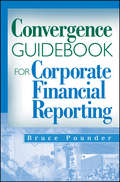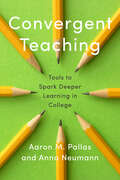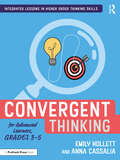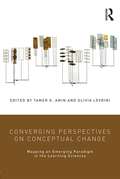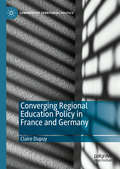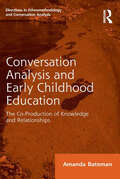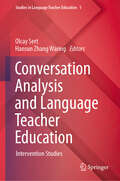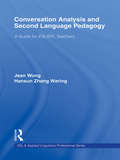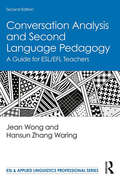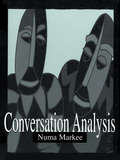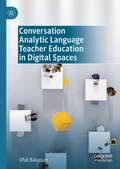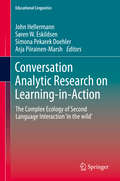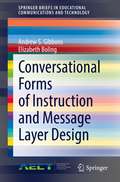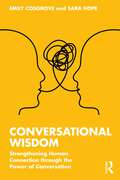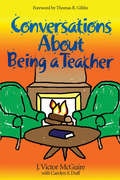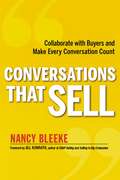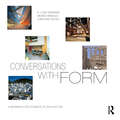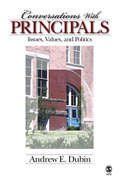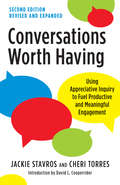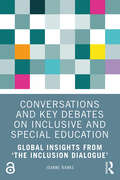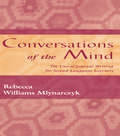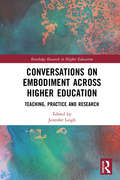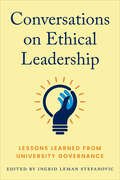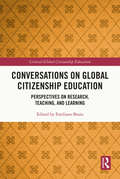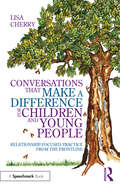- Table View
- List View
Convergence Guidebook for Corporate Financial Reporting
by Bruce PounderAs a result of the global convergence of financial reporting standards, U.S. GAAP is changing profoundly. U.S. GAAP is also being abandoned by many public and private companies, and will eventually be replaced by a higher-quality set of global standards. The Convergence Guidebook for Corporate Financial Reporting provides the timely, practical guidance that CFOs, controllers, and other financial managers need in order to prepare for the impact of Convergence on their companies, departments, and careers. Guidebook readers will also learn why they must begin preparing for "the next big challenge in corporate financial reporting" now.
Convergent Teaching: Tools to Spark Deeper Learning in College (Reforming Higher Education: Innovation and the Public Good)
by Aaron M. Pallas Anna NeumannHow what we know about K–12 education can revolutionize learning in college.Honorable Mention in the Foreword INDIES Award for Education by FOREWORD Reviews, Winner of the 2021 Bronze IPPY Award for Education IIAmid the wide-ranging public debate about the future of higher education is a tension about the role of the faculty as instructors versus researchers and the role of teaching in the mission of a university. What is absent from that discourse is any clear understanding of what constitutes good teaching in college. In Convergent Teaching, masterful professors of education Aaron M. Pallas and Anna Neumann make the case that American higher education must hold fast to its core mission of fostering learning and growth for all people.Arguing that colleges and universities do this best through their teaching function, the book portrays teaching as a professional practice that teachers should actively hone. Drawing on rich research on K–12 classroom teaching, the authors develop the novel idea of convergent teaching, an approach that attends simultaneously to what students are learning and the personal, social, and cultural contexts shaping this process. Convergent teaching, they write, spurs teachers to join students' cognitions with the students' emotions and identities as they learn. Offering new ways to think about how college teachers can support and advance their students' learning of core disciplinary ideas, Pallas and Neumann outline targeted actions that campus administrators, public policy makers, and foundation leaders can take to propel such efforts. Vivid examples of instructors enacting three key principles—targeting, surfacing, and navigating—help bring the idea of convergent teaching to life.Full of research-based, practical ideas for better teaching and learning, Convergent Teaching presents numerous instances of successful campus-based initiatives. It also sets a bold agenda for disciplinary organizations, philanthropies, and the federal government to support teaching improvement. This book will challenge higher education students while motivating college administrators and faculty to enact change on their campuses.
Convergent Thinking for Advanced Learners, Grades 3–5 (Integrated Lessons in Higher Order Thinking Skills)
by Emily Hollett Anna CassaliaConvergent Thinking for Advanced Learners, Grades 3–5 will teach students how to approach problems with a critical and evidence-based mindset. Convergent thinking is a skill which helps students arrive at defensible solutions. Working through the lessons and handouts in this book, students will learn strategies and specific academic vocabulary in the sub-skills of observation, using evidence, considering perspectives, reflection, and deduction to find accurate solutions. This curriculum provides cohesive, scaffolded lessons to teach each targeted area of competency, followed by authentic application activities for students to then apply their newly developed skill set. This book can be used as a stand-alone gifted curriculum or as part of an integrated curriculum. Each lesson ties in both reading and metacognitive skills, making it easy for teachers to incorporate into a variety of contexts.
Converging Perspectives on Conceptual Change: Mapping an Emerging Paradigm in the Learning Sciences
by Tamer G. Amin Olivia LevriniConceptual change, how conceptual understanding is transformed, has been investigated extensively since the 1970s. The field has now grown into a multifaceted, interdisciplinary effort with strands of research in cognitive and developmental psychology, education, educational psychology, and the learning sciences. Converging Perspectives on Conceptual Change brings together an extensive team of expert contributors from around the world, and offers a unique examination of how distinct lines of inquiry can complement each other and have converged over time. <P><P> Amin and Levrini adopt a new approach to assembling the diverse research on conceptual change: the combination of short position pieces with extended synthesis chapters within each section, as well as an overall synthesis chapter at the end of the volume, provide a coherent and comprehensive perspective on conceptual change research. <P><P> Arranged over five parts, the book covers a number of topics including: <li>the nature of concepts and conceptual change <li>representation, language, and discourse in conceptual change <li>modeling, explanation, and argumentation in conceptual change <li>metacognition and epistemology in conceptual change <li>identity and conceptual change. <P><P> Throughout this wide-ranging volume, the editors present researchers and practitioners with a more internally consistent picture of conceptual change by exploring convergence and complementarity across perspectives. By mapping features of an emerging paradigm, they challenge newcomers and established scholars alike to embrace a more programmatic orientation towards conceptual change.
Converging Regional Education Policy in France and Germany (Comparative Territorial Politics)
by Claire DupuyHow have regionalization processes across Europe impacted on policy convergence? This book takes as its starting point the curious fact that autonomous regional policymaking may be parallel to regional governments pursuing policy similarity. The author proposes that these observations are paradoxical only if sector-specific policy norms are disregarded and when autonomy is considered as the exclusive goal of regional governments. Focusing on common yet under-studied regional situations where a sense of cultural or historical distinctiveness is not readily apparent, if at all, the book argues that in policy sectors where norms of territorial equality have long been dominant, regional governments endorse them as a way to secure or expand their policy capacity when the central state or other policy entrepreneurs challenge it. This results in converging policies. A textured comparative account of educational policymaking in German Länder and French conseils régionaux over three decades forms the backbone of this analysis of policymaking in ordinary regions.
Conversation Analysis and Early Childhood Education: The Co-Production of Knowledge and Relationships (Directions in Ethnomethodology and Conversation Analysis)
by Amanda BatemanThis book provides insight into the everyday activities co-produced by teachers and young children, demonstrating the fine details of teaching and learning as knowledge is shared through the everyday activities of talk-in-interaction. Adopting an ethnomethodological perspective, together with conversation analysis and membership categorisation analysis, it reveals how teaching and learning are jointly accomplished during activities such as pretend play episodes, during disputes, managing illness and talking about the environment. Through in-depth studies of child-teacher interactions, the book explores the means by which knowledge is transferred and episodes of teaching and learning are co-constructed by participants, shedding light on the co-production of social order, the communication of knowledge and manner in which professional and relational identities are made relevant in interaction. As such, Conversation Analysis and Early Childhood Education will be of interest not only to scholars of ethnomethodology and conversation analysis, but also to those working in the areas of early childhood studies and pedagogy.
Conversation Analysis and Language Teacher Education: Intervention Studies (Studies in Language Teacher Education #1)
by Hansun Zhang Waring Olcay SertReconceptualizing intervention and change in conversation analytic perspectives, this volume not only illustrates actual, rather than imagined, ways of conducting CA-informed interventions in a variety of teacher-training contexts around the globe but also documents the impact of such interventions on teacher development. &“The contributors to this volume have intentionally moved CA beyond a descriptive methodology to recognizing how CA-influenced decisions and procedures can, and do, result in productive changes in teachers&’ interactional and instructional pedagogies. A gift to the field of Language Teacher Education, this volume offers rich data-driven evidence of the material impact of engagement with CA on the professional development of language teachers.&” (Karen E. Johnson, The Pennsylvania State University, USA) &“The contributors illustrate how CA-based frameworks can help both pre-service and in-service language teachers sharpen their professional vision and enhance their pedagogical skills, making a compelling case for integrating CA into language teacher education while offering concrete guidance for developing teachers' interactional awareness and competence. This groundbreaking volume will be a key reading in both Applied Linguistics and TESOL programmes.&” (Steve Mann, University of Warwick, UK) &“Conversation Analysis (CA) should be an integral part of teacher-training programs. This plea is convincingly made in this new volume. After many years of CA studies of classroom interaction, it was only a matter of time before CA should enter teacher-training programs. The reports from the US, Sweden, Germany, Türkiye and Japan in this volume show that that time is now.&” (Tom Koole, University of Groningen, The Netherlands) Olcay Sert is Professor of Language Education at Mälardalen University (Sweden). He is leading the Mälardalen INteraction & Didactics (MIND) Research Group and is the editor of Classr
Conversation Analysis and Second Language Pedagogy: A Guide for ESL/ EFL Teachers (ESL & Applied Linguistics Professional Series)
by Hansun Zhang Waring Jean WongConversation and speaking skills are the key building blocks for much of language learning. This text increases teachers’ awareness about spoken language and suggests ways of applying that knowledge to teaching second-language interaction skills based on insights from Conversation Analysis (CA). Conversation Analysis and Second Language Pedagogy: reviews key CA concepts and findings directly connects findings from CA with second language pedagogy presents a model of interactional practices grounded in CA concepts includes numerous transcripts of actual talk invites readers to complete a variety of tasks to solidify and extend their understandings features a useful collection of practical teaching activities. The time is ripe for a book that blends conversation analysis and applied linguistics. This text takes that important step, extending the reaches of these once separate academic fields. Assuming neither background knowledge of conversation analysis nor its connection to second language teaching, it is designed for courses in TESOL and applied linguistics and as a resource for experienced teachers, material developers, and language assessment specialists seeking to update their knowledge and hone their craft.
Conversation Analysis and Second Language Pedagogy: A Guide for ESL/EFL Teachers (ESL & Applied Linguistics Professional Series)
by Jean Wong Hansun Zhang WaringNow in its second edition, this volume offers a strong synthesis of classic and current work in conversation analysis (CA), usefully encapsulated in a model of interactional practices that comprise interactional competence. Through this synthesis, Wong and Waring demonstrate how CA findings can help to increase language teachers’ awareness of the spoken language and suggest ways of applying that knowledge to teaching second language interaction skills. The Second Edition features: Substantial updates that include new findings on interactional practices Reconceptualized, reorganized, and revised content for greater accuracy, clarity, and readability Expanded key concepts glossary at the end of each chapter New tasks with more transcripts of actual talk New authors' stories The book is geared towards current and prospective second or foreign language teachers, material developers, and other language professionals, and assumes neither background knowledge of conversation analysis nor its connection to second language teaching. It also serves as a handy reference for those interested in key CA findings on social interaction.
Conversation Analysis: Capturing Transitions In The Classroom (Second Language Acquisition Research Series #295)
by Numa MarkeeConversation analysis is a methodology that originated over three decades ago as a sociolinguistic approach but has since been adopted by scholars in a variety of other areas, including applied linguistics and communication. It is of great utility in second language acquisition research for its demonstrations of how micro-moments of socially distributed cognition instantiated in conversational behavior contribute to observable changes in the participants' states of knowing and using a new language. This volume describes the methodology in detail, discusses its relevance for current theories of SLA, and uses two extended examples of conversational analysis to show how learners succeed or fail at the job of learning the meaning of a word or phrase in conversational context. This book is one of several in LEA's Second Language Acquisition Research Series dealing with specific data collection methods or instruments. Each of these monographs addresses the kinds of research questions for which the method/instrument is best suited, its underlying assumptions, a characterization of the method/instrument and extended description of its use and problems associated with its use. For more information about these volumes, please visit LEA's Web site at www.erlbaum.com
Conversation Analytic Language Teacher Education in Digital Spaces
by Ufuk BalamanThis book presents original research on language teacher education (LTE) activities in digital spaces, making use of a multimodal Conversation Analysis (CA) approach to examine multiple datasets and bring new insights into the theory, research, and practice of second/foreign language teacher education. The author conceptualizes a model of Conversation Analytic Language Teacher Education (CALTE), proposing a new knowledge base for LTE, identifying research-informed defining features, mapping the scope of an original praxis base, and providing research evidence from the implementation of this approach in and for digital spaces. The result is an argument for wide implementation and on-going improvement of the CALTE approach, and the book will be of interest to language teacher education professionals, multimodal CA researchers, and applied linguists.
Conversation Analytic Research on Learning-in-Action: The Complex Ecology of Second Language Interaction ‘in the wild’ (Educational Linguistics #38)
by Simona Pekarek Doehler John Hellermann Søren W. Eskildsen Arja Piirainen-MarshThis volume offers insights on language learning outside the classroom, or in the wild, where L2 users themselves are the driving force for language learning. The chapters, by scholars from around the world, critically examine the concept of second language learning in the wild. The authors use innovative data collection methods (such as video and audio recordings collected by the participants during their interactions outside classrooms) and analytic methods from conversation analysis to provide a radically emic perspective on the data. Analytic claims are supported by evidence from how the participants in the interactions interpret one another’s language use and interactional conduct. This allows the authors to scrutinize the term wild showing what distinguishes L2 practices in our different datasets and how those practices differ from the L2 learner data documented in other more controlled settings, such as the classroom. We also show how our findings can feed back into the development of materials for classroom language instruction, and ultimately can support the implementation of usage-based L2 pedagogies. In sum, we uncover what it is about the language use in these contexts that facilitates developmental changes over time in L2-speakers' and their co-participants' interactional practices for language learning.
Conversational Forms of Instruction and Message Layer Design (SpringerBriefs in Educational Communications and Technology)
by Elizabeth Boling Andrew S. GibbonsThis book examines the theoretical basis of one of the functional layers—the message layer—of an architectural theory of instructional design. The architectural theory (Gibbons, 2003; Gibbons & Rogers, 2009; Gibbons, 2014) identifies seven functions carried out during instruction that correspond with designable strata, or layers. The architectural theory proposes that for each layer there exists a specialized body of design languages, constructs, questions, tools, practices, processes, a professional community, and most especially, bodies of design theory. It also proposes that design knowledge from other design fields, many of which approach design from the same functional perspective, can be appropriated for the further development of knowledge within the instructional technology field. A robust literature from disparate fields supplies relevant theory for message layer design. This book builds the case for validation of the message layer by bringing together work from instructional theory, conversation theory, research in the learning sciences, intelligent tutoring system research, and K-12 education. Within this literature, the authors demonstrate the existence of the message as a structural abstraction: an independently designable entity. They trace the development of the message construct historically, showing that it has remained remarkably stable over time, independent of changing psychological, educational, and technological conventions.
Conversational Wisdom: Strengthening Human Connection through the Power of Conversation
by Emily Cosgrove Sara HopeConversation: the heartbeat of our organisations. Right now, we’re at risk of losing the art of doing it well. We need to radically change how we talk to each other, to create workplaces where people feel they belong and can thrive. This book will help you understand how to grow your conversational wisdom to create more inclusive and collaborative environments and to make work more meaningful. Conversations carry the greatest potential to impact culture, performance, brand, and engagement. Yet conversation is an under-rated and under-developed skill. Emily Cosgrove and Sara Hope have spent the last 25 years helping people and organisations strengthen human connection through the power of conversation. Drawing on their experience of working with organisations from global jewellers to charities, professional services to B Corporations, they share a wealth of tips, tools, stories, and case studies. Written in a style that is easy to understand, they offer advice on how to get the best out of conversations and get underneath some of the challenges we all face. This is essential reading for learning and development experts, people leaders, coaches and mentors, and HR managers.
Conversations About Being a Teacher
by Carolyn S. Duff J. Victor McGuireHighly readable and engaging, this unique resource helps all educators fine-tune their expectations for the teaching profession.
Conversations That Sell: Collaborate with Buyers and Make Every Conversation Count
by Nancy BleekeThis book introduces sales professionals to the collaborative conversation skills they need to?capture the buyer's attention and secure business.Today's buyers want more from sales professionals than a simple consultation. What they're hungry for are?meaningful, collaborative conversations?built on mutual value and trust, that result in a win...where they, the seller, and the organization, achieve a winning outcome. Based on the author's five-step sales system, What's in It for Them (WIIFT) - Wait, Initiate, Investigate, Facilitate, Then Consolidate - Conversations That Sell shows you how to:Prepare for an?effective sales call - Identify sales opportunities and the factors that?drive buyers to actAdjust their approach?to the type of buyer - Achievers, Commanders, Reflectors, and ExpressersMake conversations flow easily - Address problems, opportunities, wants, and needsWork through objections - Advance and close sales; and morePacked with valuable tools and examples, salespeople in all industries will discover how to increase their short- and long-term sales success by keeping the focus of every conversation where it belongs…on the buyer.
Conversations With Form: A Workbook for Students of Architecture
by N. John Habraken Andrés Mignucci Jonathan TeicherThrough a progressive series of exercises - accompanied by observational studies, examples and applied theory - Conversations with Form: A Workbook for Students of Architecture improves designers’ understanding, dexterity and resilience in making form. It specifically focuses on the skills needed to succeed in the everyday context in which the vast majority of architects will ultimately design and build, wherein no one designs in isolation and existing conditions never represent a tabula rasa. The text begins by familiarizing readers with utilizing step-by-step sequences of moves to steer the development of built form and rapidly moves to designs of increasing complexity. These design plays treat a wide-ranging series of topics including structures, patterns, types, systems and other kinds of shared form principles. Conversations with Form is a workbook for honing hands-on skills and tools of the architect’s trade. Beautifully illustrated and focused on practical, usable information, the book provides architectural students with an accessible and useable handbook for their design practice.
Conversations With Principals: Issues, Values, and Politics
by Andrew E. DubinConversations With Principals: Issues, Values, and Politics is a unique compilation of interviews with principals at the elementary, middle, and secondary levels. Unlike any other text in Educational Administration, this book allows students the unusual opportunity to experience the inner voice of principals as they discuss the many decisions they make and the multitude of people they must engage.
Conversations Worth Having, Second Edition: Using Appreciative Inquiry to Fuel Productive and Meaningful Engagement
by Jackie Stavros Cheri TorresNow in a second edition, this classic book shows how to make conversations generative and productive rather than critical and destructive so people, organizations, and communities flourish. We know that conversations influence us, but we rarely stop to think about how much impact they have on our well-being and ability to thrive. This book is the first to show how Appreciative Inquiry—a widely used change method that focuses on identifying what's working and building on it rather than just trying to fix what's broken—can help us communicate more effectively and flourish in all areas of our lives.By focusing on what we want to happen instead of what we want to avoid and asking questions to deepen understanding and increase possibilities, we expand creativity, improve productivity, and unleash potential at work and home. Jackie Stavros and Cheri Torres use real-life examples to illustrate how these two practices and the principles that underlie them foster connection, innovation, and success.This edition has been revised throughout with new examples; updates on the latest supporting research in neuroscience, positive science, and positive psychology; and a discussion guide. It also features a new chapter on what the authors call tuning in: cultivating awareness of how our physical and mental state affect our perceptions, emotions, and thoughts as we engage in conversation. This book teaches you how to use the practices and principles of Appreciative Inquiry to strengthen relationships, build effective teams, and generate possibilities for a future that works for everyone.
Conversations and Key Debates on Inclusive and Special Education: Global Insights from ‘The Inclusion Dialogue’
by Joanne BanksBased on the second series of the popular Inclusion Dialogue podcasts, Joanne Banks explores the tensions, debates and understandings of inclusive education in context of current policy changes. Featuring in-depth interviews with 12 world-renown academics, this book provides a comprehensive overview of the current tensions and conceptual understandings in the field.Delving further into diverse viewpoints around special education, and how mainstream education includes and excludes students, Banks broadens the discussions started in the first podcast series by highlighting nuanced alternative perspectives, national contexts and historical developments. Given the diversity of the authors themselves in terms of their geography, career stage and views on inclusive education, the chapters highlight key issues around how we theorise inclusive education, the diversity of views on how inclusion can be measured and the intersections between disability and other student characteristics such as socio-economic background, gender, ethnicity, race and sexuality. Using the informal interviews as its springboard, the book offers practical insights into universally designed pedagogies and the role of the school community in fostering inclusive education.This book is ideal for academics, researchers and educators working in inclusive and special education, who wish to create more inclusive environments for their students. It is also a key resource for policymakers seeking to understand inclusive education and address its manifestation in learning environments on ground.Chapter 5 of this book is freely available as a downloadable Open Access PDF at http://www.taylorfrancis.com under a Creative Commons Attribution (CC BY) 4.0 license.
Conversations of the Mind: The Uses of Journal Writing for Second-Language Learners
by Rebecca William MlynarczykAsking students to write journals that reflect on their learning has become a widespread pedagogical practice in recent years. However, the scholarly literature does not address certain key questions about how journal writing aids learning: * Is there something inherent in journal writing that encourages students to write reflectively? * What psycholinguistic or cognitive factors help to explain the power of journal writing? * Why do some students use journals to write prolifically and creatively while others limit their responses to summarizing the assigned course reading? * Why do teachers find some journal entries so much more engaging than others? * How do teachers' ways of responding to journals affect their students' development as writers and thinkers? This book addresses such questions through a careful analysis of the journal writing of the students in the author's ESL classes at a large urban college. It contains detailed case studies of five culturally- and linguistically-diverse students with widely differing responses to journal writing. To teachers of composition for both first- and second-language students and to teachers of graduate courses in education and qualitative research, this book offers a contextualized description of journal writings as a complex social activity. By emphasizing the need for educators to reexamine their pedagogy and to learn from their students, Conversations of the Mind is an indispensable contribution to the emerging literature of teacher research and reflective practice.
Conversations on Embodiment Across Higher Education: Teaching, Practice and Research (Routledge Research in Higher Education)
by Jennifer Leigh"Embodiment" is a concept that crosses traditional disciplinary boundaries. However, it is a contested term, and the literature is fragmented, particularly within Higher Education. This has resulted in silos of work that are not easily able to draw on previous or related knowledge in order to support and progress understanding. Conversations on Embodiment Across Higher Education brings a cohesive understanding to congruent approaches by drawing on discussions between academics to explore how they have used embodiment in their work. This book brings academics from fields including dance, drama, education, anthropology, early years, sport, sociology and philosophy together, to begin conversations on how their understandings of embodiment have impacted on their teaching, practice and research. Each chapter explores an aspect of embodiment according to a particular disciplinary or theoretical perspective, and begins a discussion with a contributor with another viewpoint. This book will appeal to academics, researchers and postgraduate students from a diverse range of disciplinary areas, as evidenced by the backgrounds of the contributors. It will be of particular interest to those in the fields of education, sociology, anthropology, dance and drama as well as other movement or body-orientated professionals who are interested in the ideas of embodiment.
Conversations on Ethical Leadership: Lessons Learned from University Governance (UTP Insights)
by Ingrid Leman StefanovicHighlighting ethical leadership strategies, Conversations on Ethical Leadership explores what makes for strong, well-informed, morally sound decision-making at all levels of an organization. In addressing a range of challenges faced by universities and applying those lessons to the broader community of the public and private sectors, Ingrid Leman Stefanovic and her contributors tackle a host of issues related to advancing ethics, diversity, inclusiveness, and the art of moral leadership. Each chapter, written by an author with roots in the academy, includes a subsequent commentary by a community leader who highlights the broader takeaways that emerge for society from the university experience. In this way, the book becomes a conversation between the academic and non-academic worlds about issues that affect any prominent organization. It offers a unique range of novel and timely topics, from responsibility-centred budgeting to post-pandemic planning, responsiveness to climate change, Indigenous leadership, free speech, academic integrity, and much more. In doing so, Conversations on Ethical Leadership ultimately reveals how we can build and preserve an ethically responsible sense of purpose at our post-secondary learning institutions and beyond.
Conversations on Global Citizenship Education: Perspectives on Research, Teaching, and Learning in Higher Education (Critical Global Citizenship Education)
by Emiliano BosioThis volume offers a remarkable collection of theoretically and practically grounded conversations with internationally recognized scholars, who share their perspectives on Global Citizenship Education (GCE) in relation to university research, teaching, and learning. Conversations on Global Citizenship Education brings together the narratives of a diverse array of educators who share their unique experiences of navigating GCE in the modern university. Conversations focus on why and how educators’ theoretical and empirical perspectives on GCE are essential for achieving an all-embracing GCE curriculum which underpins global peace. Drawing on the Freirean concept of "conscientization", GCE is presented as an educational imperative to combat growing inequality, seeping nationalism, and post-truth politics. This timely volume will be of interest to educators who are seeking to develop their theoretical understanding of GCE into teaching practice, researchers and students who are new to GCE and who seek dynamic starting points for their research, and general audience who are interested in learning more about the history, philosophy, and practice of GCE.
Conversations that Make a Difference for Children and Young People: Relationship-Focused Practice from the Frontline
by Lisa CherryIn this unique book, international trainer and consultant Lisa Cherry invites professionals from education, social work and healthcare to engage in conversations on a range of pertinent topics and issues affecting children and young people today. Divided into three main parts, which introduce attachment, adversity and trauma, each discussion places an emphasis on emotion and the understanding that we have as humans for compassion, empathy and connection. By encouraging collaboration between sectors and exploring a range of intersecting themes, the conversations take the reader on a winding journey to broaden their depth of thinking, reflect on their practice and to consider the central message: that we can bring about social change, one interaction at a time. This book is a call to action and an opportunity to look around and decide what kind of service we want to provide, what kind of community we want to live in and what sort of legacy we want to leave. At a time of ever-present social and political challenges, this book will stimulate conversations on current practice and professional development for the future and is a must-read for everyone working with children and young people.
